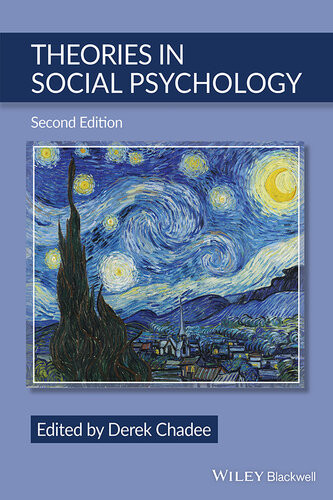Product desciption
Theories In Social Psychology 2nd Edition 2nd Derek Chadee by Derek Chadee 9781119627944, 9781119627883, 1119627885, 111962794X instant download after payment.
THEORIES IN SOCIAL PSYCHOLOGY Theories in Social Psychology develops a deeper, more robust understanding of the theoretical framework underlying the field. Providing rich insights into the central theories and perspectives that continue to shape the discipline, this edited volume brings together a panel of distinguished scholars to address thirteen social psychological theories relating to social cognition, social comparison, social reinforcement, and self. In-depth critical discussions examine topics including cognitive dissonance, reactance, attribution, social comparison, relative deprivation, equity, interdependency, social identity, and more. The expanded second edition fills a substantial gap in current literature by articulating the important psychological theories rather than placing emphasis on applied research. New and revised content helps students understand the construction and complexity of key theories while inspiring researchers of social behavior to reflect on their current work and consider future areas of investigation. This comprehensive resource: Identifies and discusses the theoretical perspectives and specific theories that form the foundation of the study of social psychology Features work from leading scholars including Bertram F. Malle, Paul R. Nail, Richard E. Petty, Thomas Mussweiler, Faye J. Crosby, and Miles Hewstone Helps students move from introductory concepts to multifaceted theoretical frameworks Theories in Social Psychology, Second Edition, remains the perfect textbook for academics and students wanting to study and discuss important social psychological perspectives and theories and attain a deeper understanding of the theoretical framework. “This book will be a very valuable tool for students and professionals alike who wish to learn theories in social psychology and the role they have played in the development of the discipline. It is comprehensive in its coverage and covers the theories in an objective and engaging way.” —Robert J. Sternberg, Professor, Department of Psychology, College of Human Ecology, Cornell University, Honorary Professor of Psychology, University of Heidelberg, Germany “In this wonderful new edition of compilation of theories, at the core of modern social psychology, presented to us by Derek Chadee, we are given a special gift that enriches scholars, teachers and students of psychology in social and general psychology. We are treated to a clear exposition of these theories some of the research and controversy that each has generated, and are given some guidelines to new paths for future exploration of their implications. My research career has benefitted from working in the domains of dissonance, attribution, and social comparison theories, but my teaching and textbook writing has relied on all of the theories and their concepts so elegantly orchestrated here.” —Phillip G. Zimbardo, Ph.D., Professor Emeritus, Stanford University


